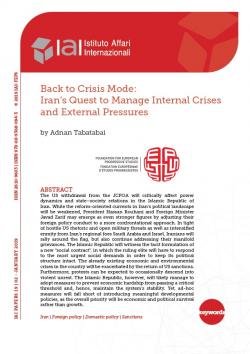Back to Crisis Mode: Iran's Quest to Manage Internal Crises and External Pressures
The US withdrawal from the JCPOA will critically affect power dynamics and state–society relations in the Islamic Republic of Iran. While the reform-oriented currents in Iran’s political landscape will be weakened, President Hassan Rouhani and Foreign Minister Javad Zarif may emerge as even stronger figures by adjusting their foreign policy conduct to a more confrontational approach. In light of hostile US rhetoric and open military threats as well as intensified enmity from Iran’s regional foes Saudi Arabia and Israel, Iranians will rally around the flag, but also continue addressing their manifold grievances. The Islamic Republic will witness the tacit formulation of a new “social contract”, in which the ruling elite will have to respond to the most urgent social demands in order to keep its political structure intact. The already existing economic and environmental crises in the country will be exacerbated by the return of US sanctions. Furthermore, protests can be expected to occasionally descend into violent unrest. The Islamic Republic, however, will likely manage to adopt measures to prevent economic hardship from passing a critical threshold and, hence, maintain the system’s stability. Yet, ad-hoc measures will fall short of introducing meaningful developmental policies, as the overall priority will be economic and political survival rather than growth.
Paper produced in the framework of the IAI-FEPS project entitled “Europe and Iran in a fast-changing Middle East: Confidence-building measures, security dialogue and regional cooperation”, January 2019.
-
Details
Rome, IAI, January 2019, 19 p. -
In:
-
Issue
19|02 -
ISBN/ISSN/DOI:
978-88-9368-094-3
1. The JCPOA and President Hassan Rouhani’s foreign policy conduct
1.1 The emergence of the “Moderates” as a third political camp
1.2 Merging domestic and foreign affairs
1.3 Institutionalisation of Iran’s foreign relations
1.4 Finalisation of a multilateral agreement
1.5 Implementation of the multilateral agreement
1.6 De-securitisation through implementation
2. The JCPOA crisis and its effect on Iran’s domestic landscape
2.1 Rouhani and Zarif will survive but their foreign policy approach will not
2.2 Potential hard-line backlash and elite realignment
2.3 Amidst hardship, voters will search for technocrats, not ideologues
3. A new social contract to navigate through times of crisis
3.1 Rallying around the flag in times of heightened tensions
3.2 The perfect mix of security, economic relief and entertainment
Conclusion and Recommendations
References



